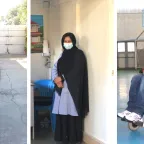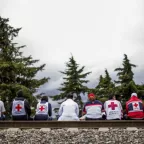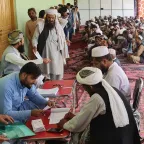Mobile field staff
… Read this article to find out more. APPLY TO JOBS RECRUITMENT & ASSIGNMENT PROCESS FOR …
… Read this article to find out more. APPLY TO JOBS RECRUITMENT & ASSIGNMENT PROCESS FOR …
… left the land and moved to the cities to find jobs.” The loss of palms and the drying of the … areas like Basra or Najaf in the search for jobs. As an example, the population of the … rural areas to go work in unskilled labor jobs in urban areas or in the oil fields. …

… shop in the port area. “The majority of the jobs available in Gaza are manual and require …
As part of its work in detention centres in Somalia, the ICRC set up a vocational training programme in Bossasso prison in 2013. Detainees are able to take courses in carpentry, masonry and sewing. …

… ICRC Hyeon-Geun shares that there are many jobs in the ICRC that new graduates or even …

Afghan's lives have been deeply impacted and transformed by over four decades of war. Some people lost a limb due to the conflict or accidents. They saw their mobility and independence reduced, faced …

… Cross: http://www.redcross.org.uk/About-us/Jobs Canadian Red Cross: http://www.redcross.ca/about-us/jobs Danish Red Cross: …

… for his family, he has been doing small jobs that earn him only around 70 AFN ($0.8) a … 2021, nearly 700,000 people have lost their jobs and nearly 90 per cent of the employed …

… told me of their problems: that there are no jobs for them, no schools for their children. … life are available – hospitals, schools, jobs, food, water, shelter – most people will … work with businesses to provide education, jobs and security, for refugees and locals. …
The ICRC recognises the need to better address the issue of social inclusion in the physical rehabilitation services it provides globally. To do this, it teamed up with the Adecco Group Foundation to …
Try one of the following resources:
Created in 1863, the ICRC library, alongside the ICRC archives, provides an indispensable documentary reference on the organization itself and international humanitarian law.
International humanitarian law is based on a number of treaties, in particular the Geneva Conventions of 1949 and their Additional Protocols, and a series of other instruments.
Customary international humanitarian law consists of rules that come from "a general practice accepted as law" and that exist independent of treaty law.